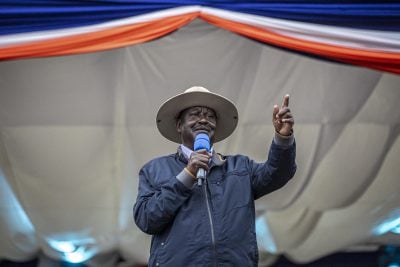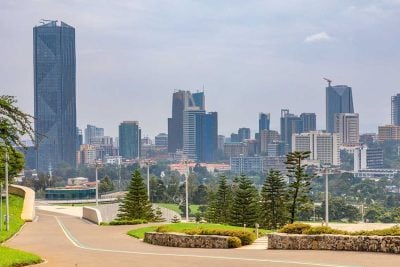David Luke, the editor of How Africa Trades, is professor in practice and strategic director at the Firoz Lalji Institute for Africa at the London School of Economics, where he oversees the Africa Trade Programme. As a former director of the African Trade Policy Centre at the UN Economic Commission for Africa (ECA), he led the technical work on the protocols that make up the African Continental Free Trade Area (AfCFTA) agreement.
Yet, despite the specialist knowledge he brings to bear on the subject area, alongside that of his five fellow contributors, the book has an admirably democratic mandate: “it aims to demystify African trade policy, which can be seen as a specialised – perhaps also esoteric – activity best left to ‘experts’, and to propagate a deeper and broader understanding of how trade impacts the lives of ordinary Africans and the continent’s development aspirations.”
Intra-African trade and integration are long-held objectives of policy leaders on the African continent, and the AfCFTA carries the aspirations of the continent to usher in a new era of progress and prosperity. By providing up-to-date information on Africa’s trade that is easily reachable through open-access publication, the book seeks to empower policymakers and other stakeholders to interrogate the effectiveness of trade agreements and policy choices.
Stubbornly concentrated extractive exports
The first essay in the collection, by Jamie Macleod and David Luke, underscores the challenges faced. Notwithstanding recent growth, Africa’s export volumes continue to underperform and fail to live up to their developmental potential. Indeed, Africa’s exports amount to just 2.3% of world trade. Furthermore, Africa’s exports have remained stubbornly concentrated in fuels, ores and metals, limiting jobs growth.
Africa’s trade represents in general an exchange of primary fuels, ores and metals for manufactures and, to a lesser extent, foodstuffs. The authors conclude that “African trade flows must change, and it is trade policy that can be the instrument of this change.”
That is the starting point for an ambitious series of essays which assess the state of play in the AfCFTA and regional trade; bilateral trade with leading partners; the impact of Covid on Africa’s trading systems; and developments under the multilateral umbrella of the World Trade Organization.
The analysis makes for sobering reading: Africa’s relations with its main trading partners are highly asymmetric. In the case of the EU – the partner with the largest share of Africa’s trade – that asymmetry is compounded by the introduction of Economic Partnership Agreements. These are in effect reciprocal trade deals, with gaps in their coverage of the regional economic communities (RECs), resulting in hard borders for EU trade between African countries within the same customs union.
China, meanwhile, is described as having only a basic policy framework to guide its trade with Africa. It is alone among the leading economies in not offering a generalised system of trade preferences to African countries, nor a programme comparable with the US Africa Growth and Opportunity Act (AGOA). And while the AGOA scheme appears generous, the fact that African beneficiaries have generally under-performed under AGOA illustrates the need for investment in productive capacity and other “behind the border” reforms, the authors write.
The crucial role of regional economic communities
So how can Africa turn things around? The relative diversification of intra-African trade reveals some promising green shoots, the authors say. Even more significantly, Africa’s regional economic communities are proving bastions of common purpose.
“In relation to the framework for trade policy analysis, the legacy RECs, the FTAs and customs unions have progressed well beyond the design phase, having established programmes that are both endogenous and exogenous to trade integration which continue to evolve,” say the authors of the second chapter.
They add that “innovations have also been introduced” in the four major RECs of sub-Saharan Africa: the Common Market for Eastern and Southern Africa (COMESA), the East African Community (EAC), the Southern African Development Community (SADC) and the Economic Community of West African States (ECOWAS). These innovations include “simplified trading regimes that enable small-scale traders to move their wares across borders under regulations that require minimum paperwork. During the Covid-19 pandemic the RECs were proactive in taking measures to ensure safe trade.”
Unity among RECs is helping Africa to present a united front to the world when it comes to trade policy. But there is still major progress that needs to be made on discussions between African countries over the harmonisation of their own trade policies – challenges that can be seen in the “stutter-starting” rollout of the AfCFTA. The culprit blocking the effective commencement of trading under the AfCFTA, the authors argue, has been rules of origin – the criteria needed to determine the national source of a product.
“With the start of trading stuck on technicalities, the AfCFTA is yet to substantively take off… Unlocking regional leadership could offer a solution, as has been the case with Kenya and South Africa in leading integration within EAC and SADC, respectively,” says Luke. “AfCFTA implementation should take account of the RECs, which have a practical function in enabling trade integration and connecting a continent that is as vast as Africa.”
The Draft Strategic Framework of the AfCFTA emphasises the importance of ensuring that the negotiating process is inclusive, participatory and consultative with all stakeholders, particularly civil society groups at the national, sub-regional and continental levels. Ensuring that a wide range of views and impacts are taken into account prior to the conclusion of the agreement will, it is argued, contribute to a robust, inclusive and sustainable AfCFTA.
It is perhaps surprising that How Africa Trades does not cover how human rights considerations will be impacted by the new trade and investment scenario. But the scheme has no shortage of challenges – as the authors acknowledge, the AfCFTA finds itself in limbo between the negotiations and implementation phases of the trade policy cycle.
A path forward
As Luke reminds us, while there is still much work to be done on the AfCFTA itself, re-working relations with major trading partners will be just as crucial. Here, Luke suggests a transformative trade deal with Africa’s external partners is desirable.
“The main elements of the ideal trade deal for Africa at this stage of its development can be sketched along the following lines: for a transitional period benchmarked against milestones in AfCFTA implementation and the gains emerging from it, a good development case can be made for Africa’s trading partners to offer to all African countries unilateral market access that is duty-free and quota-free with a cumulative rules of origin regime.”
How can this be achieved? Unity, suggests Luke, must be Africa’s watchword. The African Union Commission must be given a mandate, direction and resources to secure outcomes that meet African aspirations. Only then will AfCFTA meet its full potential and allow Africa to present a united front to the world.
“Without effective coordination, African countries are vulnerable to being outmanoeuvred in trade negotiations and in their engagement with partners,” Luke concludes. “In geoeconomics and geopolitics, individual African countries lack influence on their own to achieve meaningful outcomes that impact their development prospects. They should work together… The stakes are high.”
Want to continue reading? Subscribe today.
You've read all your free articles for this month! Subscribe now to enjoy full access to our content.
Digital Monthly
£8.00 / month
Receive full unlimited access to our articles, opinions, podcasts and more.
Digital Yearly
£70.00 / year
Our best value offer - save £26 and gain access to all of our digital content for an entire year!

 Sign in with Google
Sign in with Google 



